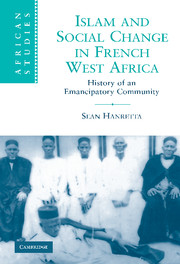Book contents
- Frontmatter
- Contents
- List of maps and figures
- Acknowledgments
- Note on orthographic conventions
- Abbreviations used in references
- Introduction
- Part One “The Suffering of Our Father”: Story and Context
- 1 Sufism and Status in the Western Sudan
- 2 Making a Revival: Yacouba Sylla and His Followers
- 3 Making a Community: The “Yacoubists” from 1930 to 2001
- Part Two “I Will Prove to You That What I Say Is True”: Knowledge and Colonial Rule
- Part Three “What Did He Give You?”: Interpretation
- Conclusions
- Glossary
- Note on References
- Index
- Books in This Series
2 - Making a Revival: Yacouba Sylla and His Followers
Published online by Cambridge University Press: 15 December 2009
- Frontmatter
- Contents
- List of maps and figures
- Acknowledgments
- Note on orthographic conventions
- Abbreviations used in references
- Introduction
- Part One “The Suffering of Our Father”: Story and Context
- 1 Sufism and Status in the Western Sudan
- 2 Making a Revival: Yacouba Sylla and His Followers
- 3 Making a Community: The “Yacoubists” from 1930 to 2001
- Part Two “I Will Prove to You That What I Say Is True”: Knowledge and Colonial Rule
- Part Three “What Did He Give You?”: Interpretation
- Conclusions
- Glossary
- Note on References
- Index
- Books in This Series
Summary
when colonial occupation began, the underlying political logic of the jihâds, according to which the state was perceived as a legitimate vehicle for the furthering of religious objectives, became simultaneously more and less compelling. On the one hand, many Muslim leaders, recognizing the overwhelming power of the colonial state, “accommodated” European administrators who agreed to grant them limited control over their communities as part of the creation of efficient and cheap systems of governance. Such figures effectively adapted the statism of the jihâd era to new conditions. In a celebrated shift, ʿUmar Tal had been one of the most radical of the jihâd leaders; his grandson, Seydou Nourou Tal, was one of France's greatest Muslim intermediaries. On the other hand, the claims of European states to be “Muslim powers” and to legitimate their rule in Islamic terms struck many as transparently false. In principle, the esoteric nature of Sufi authority provided one way for dissidents to undermine religious elites who, they believed, had compromised their integrity by engaging in political activity of a particularly corrupting sort. But this critical position had difficulty taking hold during the early years of colonial rule. The resources the colonial state provided to scholars willing to cooperate allowed accommodationists to strengthen their religious credentials. Privileged treatment of various kinds made it easier to obtain scholarly training and to attract followers who then could be presented as signs of spiritual grace and blessing. Dissidents thus often appeared as “antinomian” regardless of their specific religious teachings.
- Type
- Chapter
- Information
- Islam and Social Change in French West AfricaHistory of an Emancipatory Community, pp. 60 - 82Publisher: Cambridge University PressPrint publication year: 2009

